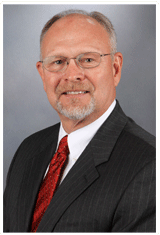Despite yet another snowstorm, we worked late into the night most evenings this week. On Monday, we were in session until 10:30 p.m., and probably would have continued if not for the impending storm. Then Tuesday, with almost 10 inches of snow on the ground here in Jefferson City, we met in the afternoon and didn’t adjourn until 3:30 a.m. the next morning. We adjourned at 8:30 p.m. on Wednesday, to the relief of most everyone here in the Senate. We needed the sleep.
The long nights paid off, though, with the Senate approving on Thursday the first major economic development bill in almost four years. The legislation also addresses tax credit reform, one of the more contentious issues in the Capitol in recent years.
Senate Bill 120 places caps on two of the state’s largest tax credits, Low-Income Housing and Historic Preservation. Reducing the amount we spend on these programs will free up revenue that we can invest in other important areas, like education. This measure is estimated to save the state $1.3 billion over the next 15 years.
The bill also creates a number of new tax incentives aimed at encouraging job growth in Missouri, including incentives to attract data storage centers to the state and a credit to support “angel investors” in start-up businesses.
This bill will save our state millions over the next decade and a half and will encourage broad economic activity in all areas of Missouri. The legislation now goes to the House for similar consideration.
We also spent a significant amount of time this week debating Senate Bill 29, otherwise known as the paycheck protection act. The bill would prohibit labor unions from using dues and fees to make political contributions. It also bars unions from withholding earnings from paychecks.
I have received hundreds of emails and calls regarding this measure. There are strong feelings on both sides of the issue. I want to assure my constituents that I WILL NOT support a measure that will have an ill effect on the hardworking citizens of my district. The bill has stalled the last two times it’s been heard on the floor, a clear indication that the measure needs more work before passage.
Senate Bill 207 was heard in committee this week. The bill allows electric corporations, such as Ameren, to recover costs for infrastructure replacement projects. It has garnered a lot of attention this year. I’ve heard from numerous constituents on this bill as well, and I appreciate their concerns.
I do not support the bill as it currently stands. I think this is another issue that needs extensive debate. We must find a way to balance the interests of both electric corporations, which employ thousands of Missouri citizens, and consumers, who have seen rates steadily creep upwards. I will keep you updated as we continue working on this bill.
The Joint Committee on Education, of which I’m a member, released the final version of the new higher education funding formula this week. The plan is the culmination of months of work and countless hours examining and studying higher education funding, not only in our state, but across the nation.
The final result is a comprehensive plan that will go far in ensuring higher education funding is divvied up equitably between our state’s colleges and universities. It also incorporates performance-based funding, an appropriations model that has gained popularity in recent years. It’s important to note, though, that these standards aren’t based on GPA, but completion of courses and graduation rates. And, performance-based funding will only be used for a relatively small portion of overall higher education appropriations. We will now begin looking at legislation to implement the funding model in Missouri.
Contact Me
I always appreciate hearing your comments, opinions, and concerns. Please feel free to contact me in Jefferson City at (573) 751-4008. You may write me at Gary Romine, Missouri Senate, State Capitol, Jefferson City, MO 65101; or email me at gary.romine@senate.mo.gov; or www.senate.mo.gov/romine. |



